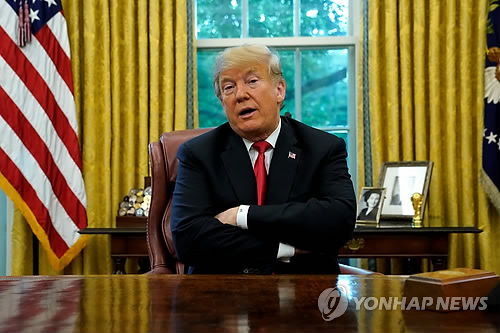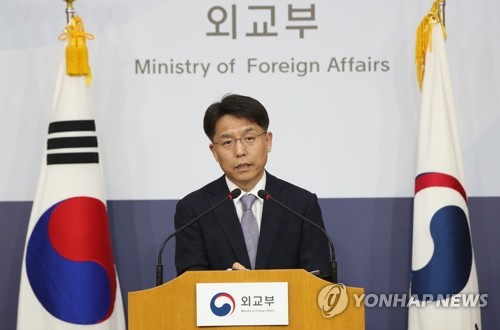(LEAD) Trump's wording triggers controversy in S. Korea
2018/10/11 16:49
(ATTN: UPDATES with N. Korea's talks with China, Russia in last 6 paras; ADDS photo)
By Lee Chi-dong
SEOUL, Oct. 11 (Yonhap) -- A controversy has erupted in South Korea over U.S. President Donald Trump's choice of words in a comment regarding South Korea's sanctions on North Korea.
Trump was responding to a reporter's question about reports from Seoul that South Korea is considering lifting some sanctions against North Korea.
"Well, they won't do it without our approval. They do nothing without our approval," he said at the White House on Wednesday (local time), according to a transcript.
The reporter was apparently referring to South Korean Foreign Minister Kang Kyung-wha's remarks a day earlier that her government is reviewing whether to lift the bilateral sanctions that were put in place to punish the North for a deadly torpedo attack on a South Korean naval ship in 2010.
At a parliamentary session in Seoul, Kang later watered down her statement, saying there are no full-fledged moves under way to remove the May 24 Measures.
Nonetheless, Trump's use of the word "approval" raised the eyebrows of Koreans for its negative connotations in country-to-country relations.
This Reuters photo shows President Donald Trump answering a reporter's qustion at the White House on Oct. 10, 2018 (Yonhap)
Formally, South Korea's Ministry of Foreign Affairs was guarded in response.
"I think it's not appropriate to comment on President Trump's remarks," the ministry's spokesman, Noh Kyu-duk, said at a press briefing.
Speaking privately, however, a ministry official questioned if Trump had been aware of the overall context of Kang's comments.
"He seems to have repeated his basic position on sanctions on North Korea," rather than specifically on the May 24 Measures, he said.
There's a view, the official added, that the president was also emphasizing the importance of consultations between the allies.
Even so, for many people here whose mother language is not English, Trump's use of the word "approval" is controversial. They regarded it being tantamount to "permission," which suggests an unequal relationship.
An English native speaker working in Seoul pointed out that there may be various ways to interpret the wording.
"Approval is more neutral in meaning. Trump probably means something closer to 'agreement' given friendly relations between the two sides, but the U.S. President doesn't always speak precisely," he said.
The ministry's spokesman, reaffirmed Seoul's commitment to maintaining sanctions on Pyongyang until there's an "assurance" of its complete denuclearization.
"Now that progress is needed in denuclearization in order to ease the sanctions, (we) will closely consult with the U.S. and other relevant countries in accordance with progress in denuclearization," Noh said.
Noh Kyu-duk, spokesman for South Korea's foreign ministry holds a press briefing in this file photo. (Yonhap)
In Moscow, senior diplomats of North Korea, China and Russia had talks and called on the U.N. Security Council to start work to "revise" sanctions.
The North's Vice Foreign Minister Choe Son-hui joined the trilateral session this week with her Chinese and Russian counterparts: Kong Xuanyou and Igor Morgulov.
They said in a join communique that the council "should start in due time revising the sanctions against the DPRK." The DPRK is the abbreviation of the North's official name, the Democratic People's Republic of Korea.
Noh said the move represents close communication among the three sides over the security conditions in Korea.
"The government takes note of consultations among North Korea, China and Russia, which are major parties concerned regarding the Korean Peninsula issue," he said.
He voiced hope that such discussions will make constructive contributions to the complete denuclearization of the peninsula and the establishment of permanent peace.
[email protected]
(END)


